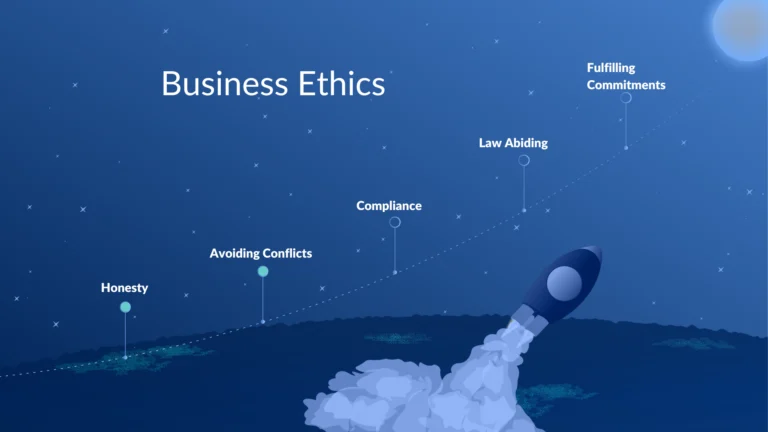

Business Ethics: Definition
In today’s ever-evolving business landscape, the importance of business ethics cannot be overstated. It serves as a guiding light for individuals and organizations alike, helping them navigate the often murky waters of commerce with a moral compass in hand. This intricate concept intricately shapes the very fabric of business conduct, weaving threads of morality into every decision and action taken within the corporate world.
The essence of business ethics lies in its complexity, encompassing a vast spectrum of principles, values, and standards. It not only distinguishes between right and wrong but also serves as the cornerstone for responsible, sustainable, and ethical business practices. This multifaceted framework is the cornerstone upon which successful, forward-thinking companies build their foundations.
At its core, business ethics challenges businesses to reconcile the pursuit of profit with unwavering adherence to principles. It necessitates a finely-tuned equilibrium between financial prosperity and social responsibility, urging organizations to transcend short-term gains in favor of long-term, sustainable growth. Embracing business ethics is, in essence, a pledge to uphold the pillars of honesty, fairness, and integrity, even when faced with the most formidable of challenges or the allure of expedient shortcuts. It’s a testament to the commitment to do what is right, not merely when it’s convenient, but when it is unequivocally the right course of action. As such, business ethics emerges not as a set of rigid rules but as a dynamic philosophy, a moral compass, and an unwavering commitment to leaving a positive impact on both the business world and society at large.
Business Ethics: Importance
The significance of business ethics reverberates throughout the modern corporate landscape. In an era of heightened transparency and social consciousness, ethical conduct is not merely a moral imperative but a strategic necessity.
First and foremost, business ethics lays the foundation for trust. Customers, both individual and corporate, are drawn to businesses that demonstrate strong ethical standards. A company that consistently acts with integrity and transparency not only retains existing customers but also attracts new ones through positive word-of-mouth.
Ethical conduct is the cornerstone of reputation management. A sterling reputation can take years to build, but a single ethical lapse can shatter it overnight. Companies that prioritize ethics are more resilient in times of crisis and better equipped to weather reputational storms.
In the internal realm of organizations, business ethics has a profound impact on employee morale and productivity. Employees are more likely to feel motivated and engaged when they work for a company that values ethical behavior. This fosters a positive workplace culture, reducing turnover and enhancing long-term performance. Additionally, ehical businesses are more appealing to investors who recognize the long-term value of responsible and sustainable practices. These investors are not only seeking financial returns but also a sense of alignment with their own ethical values.
Business ethics is more than a buzzword; it’s a strategic imperative. It is the compass that keeps businesses on course in the ever-evolving global marketplace. By embracing ethical principles, companies can forge enduring relationships, build resilient reputations, and cultivate thriving internal cultures. Ultimately, business ethics is not just about doing well; it’s about doing good, and in doing so, achieving lasting success.
Business Ethics: Examples
To understand how business ethics are applied in the real world, let’s explore some examples:
Corporate Social Responsibility (CSR): Many companies engage in CSR initiatives to give back to society. For instance, a tech giant may invest in renewable energy projects to reduce its carbon footprint, demonstrating a commitment to environmental ethics.
Fair Labor Practices:
Ethical businesses ensure fair wages, safe working conditions, and equal opportunities for employees. A retail company might implement policies to prevent child labor and support workers’ rights, showcasing its dedication to social ethics.
Transparency and Honesty:
Businesses that prioritize ethical communication are candid with their customers. A financial institution might disclose all fees and terms clearly, earning trust through transparency.
Anti-corruption Measures:
Ethical businesses have robust anti-corruption policies. A multinational corporation may have strict guidelines to prevent bribery and unethical behavior, upholding the principles of integrity and legality.
Business ethics is the compass that guides organizations through the complex terrain of commerce. Its importance lies not only in adhering to regulations but in fostering a culture of integrity and responsibility. By embracing ethical principles and setting positive examples, businesses can thrive in an ethical and sustainable manner, benefiting both themselves and the world around them.
The CXO Time Magazine is one of the leading global platforms for leaders and entrepreneurs to showcase their stories.








About Us
The CXO Time Magazine is one of the leading global platforms for leaders and entrepreneurs to showcase their stories.
Reach us: info@thecxotime.com